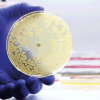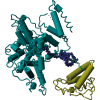A Chinese research team has proposed a new algorithm (NetMoss) for efficient integration of large-scale microbiome data and biomarker identification.

The algorithm uses microbial interaction networks to effectively integrate data from different populations. It can quantify the topological differences between different network modules by comparing the perturbations of microbial networks in different states, thus enabling the identification of disease-associated biomarkers.
Compared with previous methods, NetMoss can unbiasedly integrate different batches of microbial data more efficiently, mine disease-associated biomarkers, and identify microbial dysbiosis covariation patterns that drive the occurrence of multiple diseases.
The study is based on 11,377 sequencing samples of gut microbiome from diseased and healthy controls, covering 78 studies, 37 diseases, and 13 countries or regions. The algorithm was applied to simulated and real datasets.
It was highly accurate and robust both in the integrated dataset and in the single dataset.
Image credit | iStock




